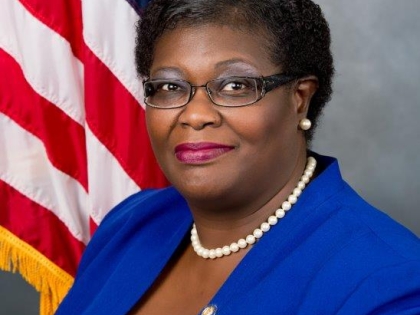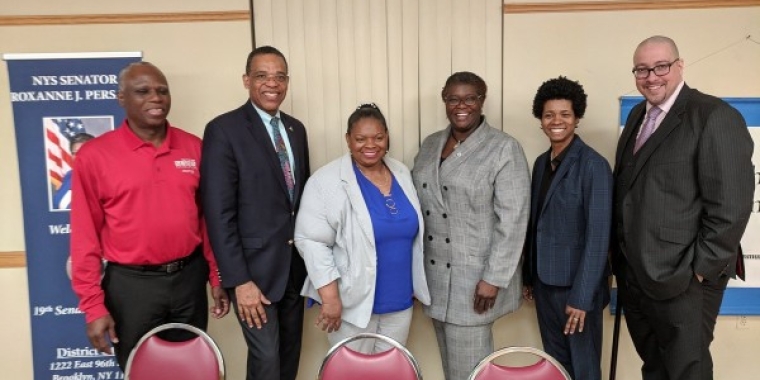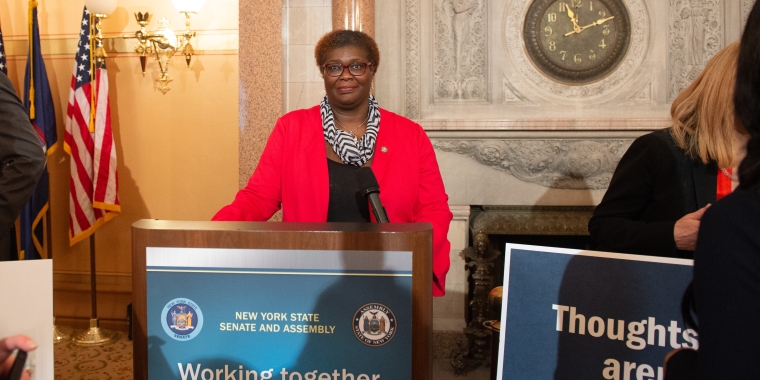
Senators Persaud, Rivera Join Health Professionals to Discuss the NY Health Act with the Community
May 3, 2019

On May 2, Senators Persaud and Rivera and a panel of health professionals converged in Eastern Brooklyn to talk about the NY Health Act with dozens of residents and answer their questions and concerns. The NY Health Act (Bill S3577), sponsored by Senator Rivera, would create a universal health care system in New York State where all citizens would receive comprehensive health care coverage. This "single-payer" system would be financed through an equitable new tax structure based on income.
At the forum, beyond illustrating how the NY Health Act would change health care in New York, the Senators shared their own frustrating personal experiences with the current "multi-payer" health care system, echoing, "Wealth should not equal health." Expanding on their sentiments, panelists Dr. Sandra R. Scott, Dr. Donald Moore, Ari Moma and Velda Jeffrey demonstrated the inadequacy of the present system in place from an inside perspective. Dr. Scott is a leader of Emergency Medical services at Rutgers NJMS, Lincoln Medical Center in the South Bronx and Brookdale University Hospital and Medical Center. Dr. Donald Moore is a physician at New York Methodist Hospital and teaches at various medical schools in New York City. Ari Moma is a registered nurse, union leader and member of The New York State Nurses Association. Velda Jeffrey is a leader in the Political Action Department of 1199SEIU.
Following the presentations, questions were answered from the audience; common concerns revolved around what the financial burden of NY Health would be like for taxpayers as well as healthcare providers, who would receive coverage and the status of the legislation. The panel clarified that the proposed system would be funded through income tax, or "payroll tax," meaning one's "ability to pay;" they also mentioned most New Yorkers would pay less, whereas wealthy residents would pay more. Moreover, the panel added there would be no co-pays but that a board would be established to create provisions for healthcare providers so they are sufficiently reimbursed for their services. Regarding who would be covered, the panel reiterated "everyone," including undocumented residents and those receiving long-term care but unmistakably excluding any non-residents of New York. As for the status of the NY Health Act, the panel said support for the bill is growing in the State Legislature and similar forums and public hearings will be held in the future.
Senator Roxanne J. Persaud said:
"The first question asked to someone seeking treatment should not be 'What's your health insurance?' Our health and well-being should come before the dollar received. In New York, we are starting that conversation; and where New York goes, the rest of the country follows. It is important we get it right, not quickly, which is why we are having these conversations with the community so their opinions are reflected in the NY Health Act. Thank you to Senator Rivera for sponsoring this important legislation and the presenters and organizations who contributed their time, efforts, services and resources to making this 'conversation' possible."
Senator Gustavo Rivera said:
“I want to thank Senator Persaud for giving me the opportunity to speak directly to her constituents about the New York Health Act and how this proposal would ensure comprehensive health care coverage for all New Yorkers. I look forward to working with Senator Persaud and my colleagues in the Senate Majority Conference to make this legislative proposal a reality in New York State.”
Dr. Sandra R. Scott said:
"Every New Yorker deserves stress free quality health care. The New York Health Act is solution for closing the gaps in our healthcare system. It is important for every New Yorker to participate in the conversation and to get involved in this very important legislation."
Dr. Donald Moore said:
"Health cannot be a simple commodity like gold or oil, exchanged in the marketplace. Healing cannot merely being a business. The doctor-patient relationship must reduce to a simple business contract. The financing of healthcare should rely on the needs of the people and be for the people. We must return healthcare to the people.”
Share this Article or Press Release
Newsroom
Go to NewsroomHighlights of January 2019
February 1, 2019

Senator Persaud Commends Passage of Firearm Safety Legislation
January 29, 2019

States Are Funding the Gun Violence Research the Feds Won’t
January 29, 2019